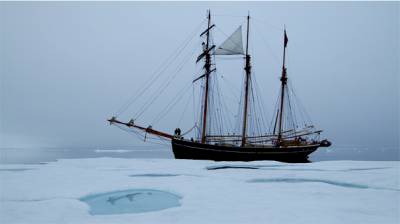by Gustavo Garcia Lopez and Salvatore Paolo de Rosa
Je hais les voyages et les explorateurs” (“I hate travels and explorers.
C. Lévi-Strauss (1955), Tristes Tropiques¹
Following our previous two posts (HERE and HERE) on the Tales from Planet Earth film festival in Stockholm, Sweden (9-12 April) this post focuses on the film Expedition to the End of the World (Daniel Dencik, 2013). It was one of several featured documentaries on the festival’s third day as part of the topic “The Circumpolar North”, perhaps the most controversial movie of the festival, and at the same time the most esthetically appealing. The film tracks a group of natural scientists (a marine biologist, an archeologist, a geologist) and artists (a painter, a writer, and a photographer) in their exploratory adventure to Greenland. The film is entertaining, with a good dose of ironic humor as the group constantly makes wry comments and mock themselves and their expedition. The photography is incredible, although arguably it is thanks to Greenlandic landscapes and maybe National Geographic does it better.
 But the message is problematic, to say the least. On the one hand, the film could be interpreted as mocking or questioning this expeditionary fervour. We see the scientists flying around in a small winged boat without any apparent purpose, shooting their guns at targets and playfully using their drilling machine (which they also sit in for pleasurable massages). In the initial scene, the artist falls down and accidentally shoots into the air. In one telling scene, the writer in the group questions the concept of nature as beautiful, saying that he could not conceive of mountains or even animals looking at the landscape and thinking ‘what a beautiful day’. At one point in the movie, the same artist wonders in ironic tone if they are going to shoot again with their guns. It is an anthropocentric perspective, yes, but it also questions the human-nature divide that serves as the basis of ‘techno-scientific’ discourses and underscores the social construction of nature that Raymond Williams, William Cronon and others have pointed out, and which serve as one of the focus points of political ecology. The most political moment perhaps is when the group encounters an expedition of oil explorers. But even then, it is very individualistic.
But the message is problematic, to say the least. On the one hand, the film could be interpreted as mocking or questioning this expeditionary fervour. We see the scientists flying around in a small winged boat without any apparent purpose, shooting their guns at targets and playfully using their drilling machine (which they also sit in for pleasurable massages). In the initial scene, the artist falls down and accidentally shoots into the air. In one telling scene, the writer in the group questions the concept of nature as beautiful, saying that he could not conceive of mountains or even animals looking at the landscape and thinking ‘what a beautiful day’. At one point in the movie, the same artist wonders in ironic tone if they are going to shoot again with their guns. It is an anthropocentric perspective, yes, but it also questions the human-nature divide that serves as the basis of ‘techno-scientific’ discourses and underscores the social construction of nature that Raymond Williams, William Cronon and others have pointed out, and which serve as one of the focus points of political ecology. The most political moment perhaps is when the group encounters an expedition of oil explorers. But even then, it is very individualistic.
Ultimately, the force of the expeditionary discourse and performance as well as the selection of the group trap the film, and the director fails to explore the deeper political and ecological implications of this expedition. The crew does not include any social scientists, all but one are men, and only one of is from Greenland (the others are from Greenland’s colonizer, Denmark). For instance, there is no mention of the Inuit which inhabited this land, or the colonial-military Danish rule over Greenland (in fact, the crew member from Greenland remains largely silent for much of the movie, de facto invisibilized). The Danish perspective becomes evident even in the supposedly most critical mind. The overall picture that emerges is one of a spoiled wealthy group of Eurocentric kids playing around with being Indiana Jones on the ice. They also have many expensive toys to play with.
The film also fails to address the unequal impacts of climate change, because the participants selected by the director remain engaged in the dominant discourse of humanity as this unified great force leading to drastic ecological change. On several occasions, the scientists question if it is so bad that the human race would disappear. “Maybe it would be better if we were all hunter gatherers again because we would not pollute the planet”, says one of the scientists. “We will find a way to adapt, as we always did; maybe we’ll invade Switzerland or Mongolia”, says the writer. But as Nixon mentioned in his inaugural speech, this Anthropoceneanalysis hides the fact that some are polluting and consuming much morethan others. Not everyone will feel the impacts of climate change equally, nor will everyone in the ‘human race’ be able to adapt – those with power and money will. Ultimately then, the film, as several others in the festival, lacked a deeper exploration of the political dimension of the ecological issues being presented. It also underscores the challenges of making documentaries that are moving and political at the same time and finding a balance between fact and fiction.
¹ Thanks to Felipe Milanez, ENTITLE fellow, for such a timely reference to this quote during our debate about the movie.





